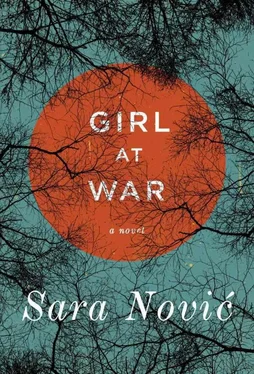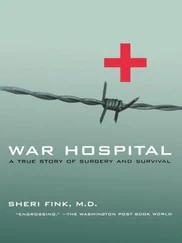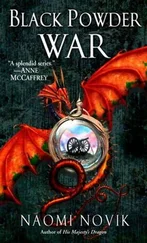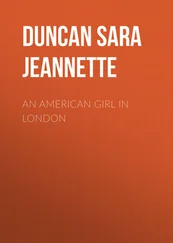—
For the first week I sat on her kitchen floor with my back to the wall and my knees to my chest. I counted the squares in the linoleum, stared at the crack in the dining table leg, scratched at my gauze-wrapped wrists. I blinked rarely, and moved with a halting, mechanical edge. At night I slept in the same spot, curling into a knot on the floor.
The woman’s son, a boy a few years older than I was, left the house early each morning and came home after dark. He stomped around in combat boots and talked incessantly of the “Safe House.” It was a phrase I’d never heard before, and I assumed it was the village’s bomb shelter. The boy never spoke to me, walked in wide arcs around my spot as if I had a contagious illness. I felt like I did. The woman gave me water in a tin cup and bread with butter, but it was hard to eat. Even breathing was a conscious effort. The first few times the air raid siren sounded the woman tried to coax me into going to the shelter with her, but I stayed in my corner. The explosions of that first week were inconsequential; I was anesthetized to fear.
The woman had visitors who entered under various pretenses and examined me from the corners of their eyes but spoke as if I wasn’t there at all.
“Maybe she’s just stupid,” someone offered.
“Maybe she’s mute.”
“She’s not stupid,” said the woman, whose name these conversations revealed was Drenka. “It’s not that she can’t talk. She just won’t. I can tell.”
“Seems to me she got a shock,” said one of the kinder old women. “I saw her all bloodied up when you found her.”
Eventually my novelty wore off, and I became privy to the women’s gossip — stories about the mixed Serb-Croat family who had lived across the street and disappeared in the middle of the night, about the next-door neighbor’s daughter, who was fifteen and pregnant.
The JNA air force had crushed the village at the start of the war as part of their mission to make a Serbian path to the sea. Afterward, a small band of Četnik rebels — some of them villagers themselves — had taken control. The Četniks made alternating rounds between this village and several others along the same stretch of highway, interdicting humanitarian aid and Croatian military supplies and holding down the settlements as way stations for their own convoys. They had decided not to kill us, at least not all of us, not yet, so the UN and NATO food aid would keep coming. When they were in town, the Četniks maintained headquarters in the schoolhouse at the center of the village, the shutters lashed closed with a convoluted twist of bungee cords. From the women’s screams, everybody knew what happened inside.
“Now you will give birth to a little Serb soldier,” they had told the neighbor girl as they raped her. When she came to borrow flour, I stared at the stained brown shirt stretched thin over her growing stomach.
—
I left the house for the first time when the chickens exploded. These days the JNA bombed the village sporadically, almost as if by accident. The initial detonations resulted in predictable damage — blown-out buildings, shattered glass — but the real danger lay in the clearing smoke. As the bombs fell they released showers of tiny metal balls. The outside world called them “cluster bombs.” We called them zvončići , jingle bells. They were not like traditional land mines or trip wires constructed to kill in combat zones. Zvončići clung to tree branches and roof tiles, nestled in patches of grass; they fell indiscriminately, like combustible hail. They were patient, making up for what they lacked in size with the element of surprise. They had surprised the chickens. The blast shook the floor, and I jumped up and ran out the front door. The sun hurt my eyes, and on unsteady legs I strained to keep up with Drenka and her son. Behind the house a cloud of feathers was settling, and I tried not to look.
Most of the village sat along a single street, the homes unvarying in style and size. Exposed cinder block was the prevailing façade in those mountains, chosen to say “we are sturdy and permanent.” But the gray brick appeared perpetually unfinished, blurting out instead “we are poor.” Now riddled with shell fragments, the pockmarked houses looked even more dismal. Beyond them, uneven plots of farmland sprawled along the valley, a collage of mottled greens and browns, singed fields of wheat and corn. At the traffic circle were the school the Četniks had commandeered and the Catholic church, which, likely because it was missing a wall, they had left alone. There was also a post office and a market, though neither functioned, not the way they should. An armored truck delivered UN flour, milk powder, and vegetable fat to the post office (no one could say for sure whether they’d seen actual Peacekeepers in person) and depending on the week — whether or not the Četniks were around — either we got it or we didn’t.
In the shelter, seeing everyone at once, I noticed that the villagers had uniformed up in various shades of olive. They studied my bloodied T-shirt with equal interest. Some people had uniforms with Hungarian writing stamped on them, leftovers from their revolution decades earlier, but most just wore any combination of green they could put together. Afterward, when we returned to her house, Drenka offered me the smallest green attire she had — a T-shirt and cargo pants with a patch over the knee, which her son had outgrown.
“Now that you’re going outside,” she said. Reluctantly I surrendered my own clothes to her for washing. I wanted to tell her not to get rid of them. She seemed to understand, or else she didn’t want to be wasteful; she didn’t throw them out.
Outside, I learned about running. Not the bouncy, pleasurable kind I’d done while playing football or tag with my friends, but a streamlined, adrenaline-injected version of my normal stride. Once I started I ran everywhere — to the water pump, to the post office for UN food, to the underground shelter. When one was maneuvering from house to bomb shelter, it might at first seem logical to travel in as straight a line as possible, to take the quickest way. But I always ran in a haphazard zigzag — believing I could upset the statistical probabilities of hitting a land mine by forging an incoherent path, believing, in the egocentric mind-set of all children, that I was the main target. I was afraid one of the soldiers had seen me pretending to die in the forest and now, spotting me alive and well, was out to finish what he’d started. After a while, though, I noticed that others were running in crooked lines, too. When the Četniks climbed to the rooftop of the school and sprayed bullets along the road, it was clear we were justified in our self-centeredness. Somewhere in the dead space between house and shelter civilians became soldiers.
—
A few days after the chickens’ demise, Drenka’s son talked to me for the first time.
“I’m Damir.” I’d known his name already, but this was the first time he’d addressed me directly, and I nodded as if he’d told me something new. “You can come with me if you like.” He handed me a khaki sweatshirt and a camouflage cap, then walked out the door without checking to see whether I was coming. The shirt was huge and smelled sweaty, but I pulled it on anyway. Over the weeks I’d come to like Damir, the confident way he marched around the house, the excited chatter about his “safe house,” which, I was piecing together, was not the same as the shelter. Could he be inviting me there? Pressing the hat down hard on my head, I followed him into the street. He ducked down an alley and through the side door of a house perforated with bullet holes.
The Safe House had once been just a regular house, though no one ever spoke of whose it was or what had happened to them. Inside, my eyes watered; the rooms were dim, shutters drawn, and the whole place was cloaked in a nicotine haze. Damir was talking to the front door guards, and I hung as close to him as I could without being a nuisance, studying the house as my vision cleared. On the walls were pictures of well-oiled topless women and the deep-browed, prominent-nosed face even I recognized as General Ante Gotovina, whose likeness was fast becoming the logo of the Croatian resistance. Ultranationalist slogans were spray-painted on every smooth surface: walls, doors, countertops —za dom, spremni —for the home, ready. The furniture was smashed, save for one red leather chair in the middle of the kitchen, which no one ever sat in. Gotovina’s Chair, we called it.
Читать дальше












